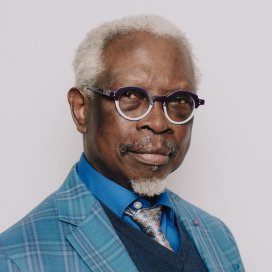SpeakersValérie Spaëth
Director of the Department of Literature, Linguistics, and Didactics (LLD), she is one of the first researchers in DDLC to explore the links between history, colonization, and language education. Her research themes include the history of teaching French as a foreign language (FLES), the history of French as a second language (FLS) didactics, the history of the Alliance Israélite Universelle and the Alliance Française, francophonie, and the politics and didactics of FLS. Her conference will be titled: French, a language grappling with its history? Salikoko Mufwene
Salikoko S. Mufwene holds the Edward Carson Waller Distinguished Service Professorship of Linguistics at the University of Chicago. He is also a professor in the Department of Race, Diaspora, and Indigeneity. His research focuses on linguistic evolution from an ecological perspective, especially on the phylogenetic emergence of language and linguistic speciation. This latter aspect particularly focuses on the emergence of creole languages and other forms of indigenization of European colonial languages, as well as language vitality. His conference will be titled: The place of French in post-colonial Africa: the language must sustain its people. Despite the discourse of the OIF on the benefits of French as a "shared language" among its member countries (see below), it was introduced during the colonial period as a tool for control and domination of indigenous peoples. Its usage fields were non-traditional, especially in colonial administration and in the upper echelons of the army, police, and judiciary, as well as among white workers in health and economic services where only Europeans (French or Belgians) were in charge. These communicated with indigenous peoples who worked for the success of the Industrial Revolution in Europe and for the economic development of colonial powers through indigenous "colonial auxiliaries". They learned enough French to serve as interpreters while occupying the lowest level of the institutions and services identified above. Colonizers showed little interest in sharing their language with Africans other than the auxiliaries. It is after independence that the use of French expands thanks to the maintenance of the colonial system of political and economic governance by these former colonial auxiliaries who assume power. The vast majority of workers operate in indigenous languages. They show little interest in French except for the schooling of their children in the hope of a better future for them. The number of schools increases as well as the use of French as a medium of instruction, especially after the third year of secondary school. However, the formal economy, where the use of French is considered necessary, develops little. This language becomes mainly a symbol of the socio-economic status of the economic and political elites who now occupy the positions of the former colonizers. * In addition to this, French hardly develops as the majority vernacular in most former colonies and is found in complementary functional distribution with indigenous languages. Some of these serve as lingua franca and are mainly spread through informal/vernacular economy and popular culture. They also index a kind of urban modernity among the popular classes. So, one wonders why French, instead of African national languages, is promoted as the official language, when it excludes the majority of national populations. Political leaders claim that otherwise their countries would be excluded from the international scene. And why isn't French considered rather what it really is for most African populations: a useful foreign language, like English, Chinese/Mandarin, German, and Russian (among others), for those who need it? Why does it continue to function as a medium of instruction when few people need it in their daily lives after school? Who would benefit from the "partnership" promoted by the OIF among its member countries to combat the imperial expansion of English? Shouldn't African partners first be concerned that French itself could have the same effect on the vitality of indigenous languages? Do African nation-states have an interest in wanting to Europeanize or should they instead develop economically and politically as culturally African entities that prioritize the intranational utility of languages? Why not adapt indigenous languages to the needs of modern communication? All this cannot be done without first developing an economy that serves the majority of the population and operates entirely in African languages.
|
| Online user: 1 | Privacy |

|



